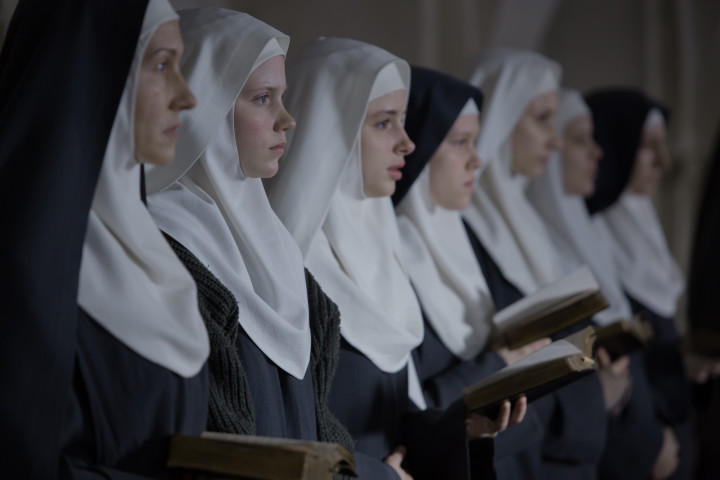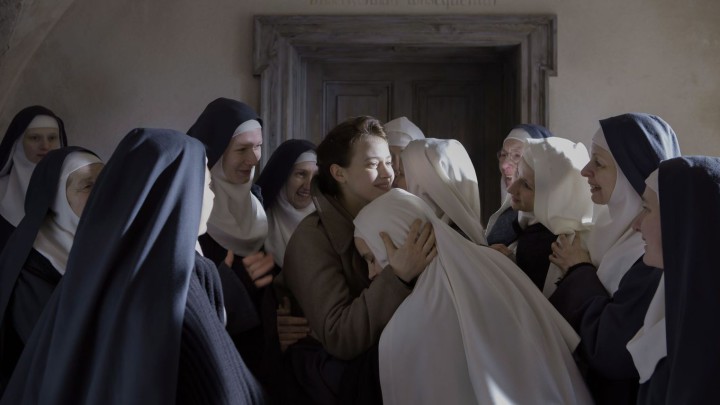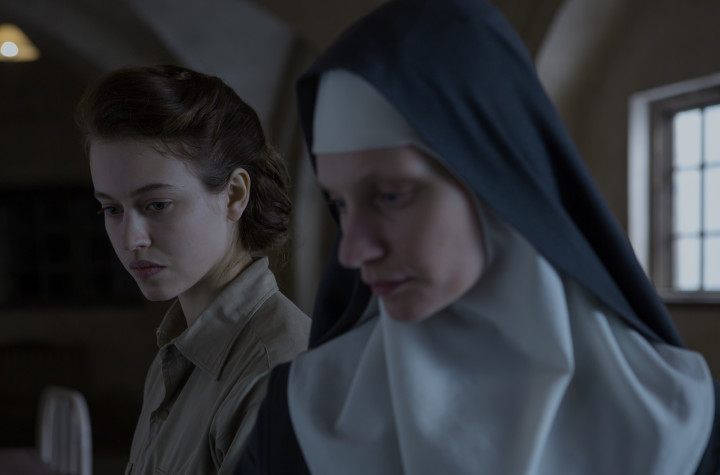For those exhausted by the summer movie season, Anne Fontaine’s The Innocents is perhaps a respite — at least for those in search of something intelligent. This is a very serious film about a very serious topic, something which you’ll have difficulty finding in theaters right now. That’s also its greatest drawback, since this is not a particularly enjoyable film. Despite moments of levity and humanity, The Innocents is inexorably a picture, set in post-World War II Poland, about abuse, trauma and faith — making for a film that can be difficult to stomach at times but is nonetheless worth the effort of viewing it.
An excellent, understated Lou de Laage plays Mathilde, a French Red Cross nurse stationed in Poland after the end of the war with the sole purpose of caring after French patients. But she’s approached by a Polish nun asking for help at her convent, something Mathilde reluctantly agrees to. There she finds that many of the nuns have been impregnated and learns of sexual abuse committed at the hands of Soviet soldiers as the war ended.
Much of The Innocents‘ narrative push focuses on the fate of the nuns. There’s a secretiveness to the plot, in that the nuns’ pregnancies could cause scandal for the convent and its eventual closure. In addition, there are the nuns’ concerns that their pregnancies — even though forced upon them — will condemn them in the eyes of God. What this reality ensures, thematically, is that Fontaine (Coco After Chanel) is allowed to examine the nature of faith in the face of such unimaginable horror. Here is a film with much on its mind, from the effects of war on women (a film written and directed by women and featuring mostly women is always welcome in such a male-centric art form) to the push and pull between religion and science — not to mention the balance between motherhood and faith. The majority of The Innocents is handled with an even hand (although there’s an unfortunate sense as the film marches on that it’s looking down on the supposed naivety of the nuns) and with a measured approach, despite the heaviness of the topics at hand.
This measuredness is an aspect of The Innocents that is an occasional drawback. Fontaine shoots everything with a workmanlike quality. Even with its slow pacing, the film feels efficient, and there’s no time for nonsense. This does not mean that Fontaine’s straight-faced approach totally lacks joy, but it’s in short supply, something expected from the film’s subject matter. Unfortunately, this doesn’t leave much to put in relief against The Innocents‘ backdrop of weighty emotion. Occasionally — as with Mathilde’s complex romantic relationship with the cynical doctor Samuel (Vincent Macaigne) — the veil is lifted to show human connection and even love. But these moments are brief, as the film gives way again to its other concerns. The Innocents is not an easy movie to watch, and a near impossible one to “enjoy,” but its thirst for exploring ideas makes it worth a look. Rated PG-13 for disturbing thematic material, including sexual assault, and for some bloody images and brief suggestive content.







Before you comment
The comments section is here to provide a platform for civil dialogue on the issues we face together as a local community. Xpress is committed to offering this platform for all voices, but when the tone of the discussion gets nasty or strays off topic, we believe many people choose not to participate. Xpress editors are determined to moderate comments to ensure a constructive interchange is maintained. All comments judged not to be in keeping with the spirit of civil discourse will be removed and repeat violators will be banned. See here for our terms of service. Thank you for being part of this effort to promote respectful discussion.